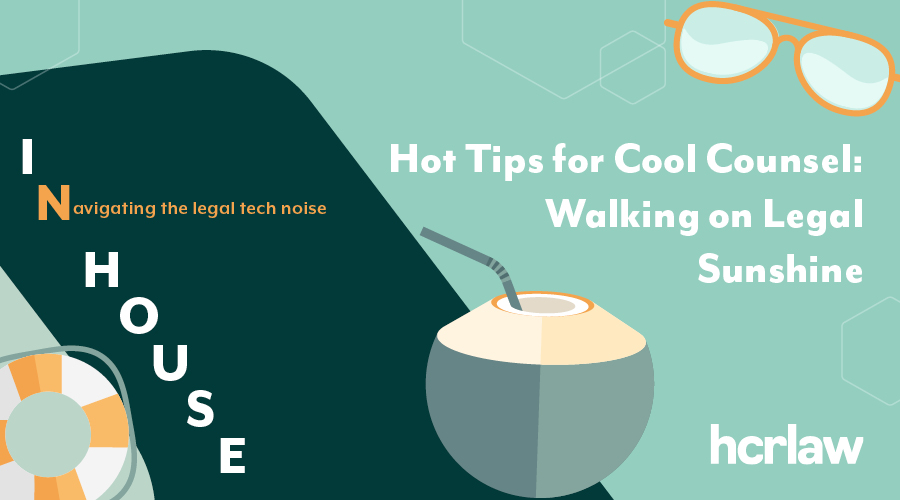

This summer, the In-House With You team at HCR Law is ‘walking on legal sunshine’ with Hot Tips for Cool Counsel, a seven-part article series created especially for in-house lawyers. Whether you’re planning ahead or tackling new challenges, these summer legal essentials offer a seasonal refresh with practical tips and insights, to help you stay sharp, compliant, and confident, whatever the summer brings.
In this issue, Frank Jennings, Partner in our Technology and Innovation team, provides a guide to cutting through buzzwords and choosing the right tech that can actually help your legal function.
In-house legal teams are under increasing pressure to do more with less, and legal tech vendors are eager to offer solutions that promise this. Separating genuine innovation from marketing spin is no small task.
Here’s how to cut through the noise and make tech decisions that deliver value.
1. Don’t fall for AI hype. Adopt tech based on outcomes
It’s all too easy to get caught up in the hype about AI. There’s no doubt AI can be transformative for in-house legal teams. The real question is what problem you need to solve for the business.
Can your AI tool reduce contract turnaround time by helping you review it quicker and improve visibility of the risks in the contract in line with your normal approach? Can an effective AI tool help speed things up by acting as a 24/7 paralegal, providing you with input quicker and in a more cost-efficient manner?
Having AI because everyone else does is not a viable business model. Ask your tech vendor to explain their AI model, get them to identify what they have used for their training data and ask them to explain their error rates.
Businesses have budgets and you need to show that your choice of AI can deliver what the business needs from the in-house legal team within the budget they have allocated. Maybe that means measuring your return on investment by reducing your backlog, automating your processes or even, dare we say it, reducing your recruitment needs?
2. Interoperability is non-negotiable
You might be looking to buy a tool that will save you time by helping you analyse the liability and indemnity clauses under a contract, or which will streamline the reviewing and sharing process. How useful is that tool if you have to migrate data out to the tool each time? Is that migrated data still confidential?
The tool should integrate with the in-house team’s document management system and other legal tech. Remember also that legal teams rarely operate in isolation. The procurement team will feed the commercial parameters into the legal team, the finance team need to have oversight of spending under the contract, the compliance team will need to ensure everything operates within the agreed parameters. The business may have or need a contract lifecycle management (CLM) or enterprise resource planning (ERP) tool.
You need to ensure the right people can access the right data at the right time so check your proposed new legal tech is interoperable with your existing systems in different departments too. If it doesn’t integrate well, the cost of change management and data migration may outweigh the benefits.
3. Proof over pitch
The tech sector is notorious for overpromising and underdelivering. Does blockchain really allow for smart and automated contracts? Can your speech-to-text tool accurately recognise your regional accent? Can your AI tool understand the nuances in your agreements without hallucinating the result?
Vendors often showcase idealised versions that can’t withstand real-world scrutiny. As in-house counsel, you should insist on seeing case studies, even if these are from other sectors or in use by other professionals. Better yet, ask for a sandboxed environment or pilot phase with your own data.
Ensure the vendor can demonstrate ROI for your team, otherwise you should continue to shop around.
What next?
In-house legal teams don’t just need any tools, they need the right tools. By focusing on outcomes, interoperability and evidence, you can make smarter decisions which are more likely to withstand scrutiny and produce a return on investment.
To read more in the ‘Hot Tips for Cool Counsel’ series click here.




